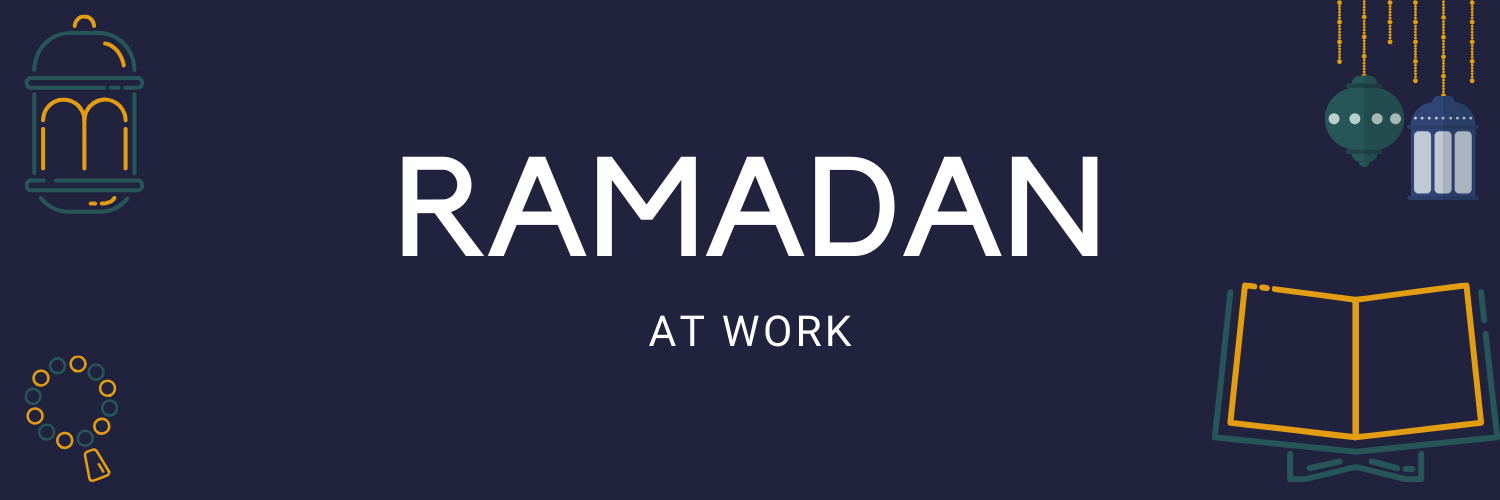Our colleague Rami has answered some questions for us about Ramadan, and how you can be aware of what it is, and what it means for Muslims both physically and spiritually at work, so you can best support colleagues who mark it.
What is Ramadan?
Ramadan is a month-long celebration when Muslims stop eating and drinking from sunrise until sunset. This month is of special importance in Islam because it celebrates the time when the holy Qur’an (holy book in Islam) was first revealed to Prophet Muhammad, the messenger of Allah (God). Fasting is one of the ‘Five Pillars’ of Islam so it is central to Islamic belief.
When is Ramadan?
Ramadan takes places in the ninth month of the Islamic calendar. It changes every year because it is based on a lunar calendar and so it follows the moon. A lunar year is 11 days shorter than the solar calendar and that is why the time of Ramadan changes every year. This year, Ramadan started on the 24th April and next year it will start approximately 10 or 11 days earlier i.e. perhaps on 13th April depending on the observation of the moon.
What is the significance of Ramadan for Muslims?
During Ramadan, Muslims reflect upon the privileges in everyday life which we tend to take for granted. For example, not being able to have a glass of water when you want helps you to appreciate the gifts we have in our life such as food and drink.
Ramadan is a time when those who are fasting think about others who do not have ready access to food and drink throughout the year. The idea is that Muslims are obliged to donate a specific percentage of their money to those who really need it most.
It is also about sharing special moments with others, for example, family members or people in the community. When the fast is broken at sunset, there is a meal called Iftar. Families may invite neighbours to share this meal with them. In Mosques, Iftar can be a communal meal where lots of people from all walks of life come together to share this meal. It is about togetherness and equality; showing mercy and compassion to others.
Not eating and drinking from sunrise to sunset is not the ultimate goal of fasting as teachings of Islam stress that this ritual is not meaningful without abstaining from saying or doing what could harm one’s self or others. It is also about being humble, kind and willing to share with others. Ramadan is an opportunity for spiritual development and not physical starvation.
How does it impact upon the workplace?
During this Ramadan in 2020, Muslims will typically be fasting for approximately 17 hours a day for 30 days. Inevitably, this will impact upon energy levels of colleagues who are fasting. Although there are no prescribed ways to support colleagues who are fasting, there are some guidelines that can be followed in this regard. It is recommended that meetings and appointments are best scheduled in the morning, and more routine activities can be left for the afternoon when energy levels start dropping. Managers are advised to consider flexible working patterns during this time. For example, an early finish for those who do not take a lunch break during Ramadan.
Bear in mind that Muslims who are fasting need to take part in regular worship during the day in addition to a special prayer for Ramadan. During this month, Muslims pay particular attention to the reading of the Qu’ran. There is an emphasis on socialising after sunset and contributing to charities. Avoid scheduling late meetings because meals need to be prepared to be ready for sunset. What is important here is to raise awareness in the workplace of when Ramadan takes place as it changes every year in addition to raising awareness of its significance for Muslims and the impact of fasting on activity levels.
Some Muslims observe Ramadan but they do not fast for personal or medical reasons. We might assume that all Muslims fast during Ramadan but this is not the case. You can ask your colleague if they are fasting. Please note that if someone is fasting, nothing should pass their lips and this includes the smoking of cigarettes, chewing gum, taking medication or sipping water. Don’t be concerned about offending anyone if you want to eat or drink during the fasting hours. Go ahead and eat, just avoid offering food or drink to your colleagues who are fasting.
How does Ramadan end?
The end of Ramadan is marked with a big celebration called Eid Al Fitre, which lasts for 3 days. In Muslim countries, this is marked with a public holiday. People tend to wear new clothes for this celebration, prepare special meals and visit friends and family. This is when Muslims will give to others e.g. donations, food, money. In non-Muslim countries, we might expect colleagues to book annual leave during this 3-day celebration. This is a great opportunity to take in food and treats to share with work teams to create a positive atmosphere amongst colleagues.
 Careers and Enterprise Blog
Careers and Enterprise Blog Susannah Gilbert
Susannah Gilbert 1187
1187


